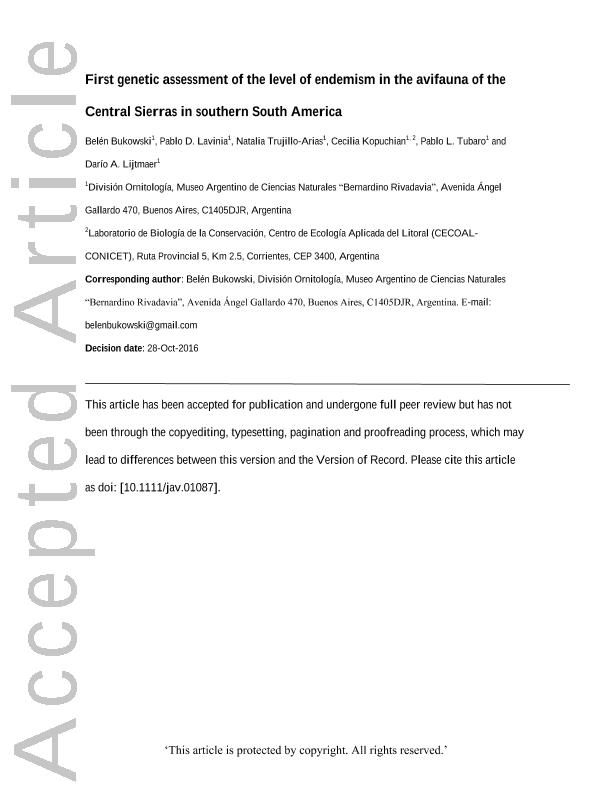Mostrar el registro sencillo del ítem
dc.contributor.author
Bukowski Loináz, María Belén

dc.contributor.author
Lavinia Oblanca, Pablo Damián

dc.contributor.author
Trujillo Arias, Natalia

dc.contributor.author
Kopuchian, Cecilia

dc.contributor.author
Tubaro, Pablo Luis

dc.contributor.author
Lijtmaer, Dario Alejandro

dc.date.available
2021-06-28T16:46:17Z
dc.date.issued
2017-05
dc.identifier.citation
Bukowski Loináz, María Belén; Lavinia Oblanca, Pablo Damián; Trujillo Arias, Natalia; Kopuchian, Cecilia; Tubaro, Pablo Luis; et al.; First genetic assessment of the level of endemism in the avifauna of the Central Sierras in southern South America; Wiley Blackwell Publishing, Inc; Journal Of Avian Biology; 48; 5; 5-2017; 726-737
dc.identifier.issn
0908-8857
dc.identifier.uri
http://hdl.handle.net/11336/135043
dc.description.abstract
The Andes constitute one of the main factors that have promoted diversification in the Neotropics. However, the role of other highland regions in the southern cone of South America has been barely studied. We analyzed the level of endemism in the avifauna of the Central Sierras in Córdoba, a high region in central Argentina, to evaluate the effect of its geographic isolation from the Andes. There are 11 species with endemic subspecies in this region, all of them described based only on differences in morphology (mainly plumage color) with no genetic evidence. We performed the first genetic analyses of seven of these species using mitochondrial DNA obtained from fresh tissue and toe pad samples. Our results show that for three of these species, Catamenia inornata, Phrygilus unicolor and Cinclodes atacamensis, the population in the Central Sierras is clearly differentiated from those of other regions, and the first two of them also show divergence among Andean subspecies. In the remaining species we found a varying degree of differentiation, ranging from a small divergence in Muscisaxicola rufivertex to the presence of different haplotypes but with an apparent lack of phylogeographic structure in Phrygilus plebejus and Sturnella loyca (being the latter the only species with a continuous distribution between the Central Sierras and the Andes) to haplotype sharing in Asthenes modesta. While further analyses including additional markers, morphological characters and vocalizations are needed, our results show that some of the species that have disjunct distributions, with a population in the Central Sierras isolated geographically from the Andes, possess distinct genetic lineages in the Central Sierras that suggest an evolutionary isolation from other populations. These findings highlight the importance of montane regions in general, and the Central Sierras in particular, as drivers of diversification in the Neotropics.
dc.format
application/pdf
dc.language.iso
eng
dc.publisher
Wiley Blackwell Publishing, Inc

dc.rights
info:eu-repo/semantics/openAccess
dc.rights.uri
https://creativecommons.org/licenses/by-nc-sa/2.5/ar/
dc.subject
ENDEMISM
dc.subject
AVIFAUNA
dc.subject
ANDES
dc.subject
CENTRAL SIERRAS
dc.subject
NEOTROPICS
dc.subject
SPECIATION
dc.subject.classification
Zoología, Ornitología, Entomología, Etología

dc.subject.classification
Ciencias Biológicas

dc.subject.classification
CIENCIAS NATURALES Y EXACTAS

dc.title
First genetic assessment of the level of endemism in the avifauna of the Central Sierras in southern South America
dc.type
info:eu-repo/semantics/article
dc.type
info:ar-repo/semantics/artículo
dc.type
info:eu-repo/semantics/publishedVersion
dc.date.updated
2021-06-22T19:06:32Z
dc.journal.volume
48
dc.journal.number
5
dc.journal.pagination
726-737
dc.journal.pais
Reino Unido

dc.journal.ciudad
Londres
dc.description.fil
Fil: Bukowski Loináz, María Belén. Consejo Nacional de Investigaciones Científicas y Técnicas. Oficina de Coordinación Administrativa Parque Centenario. Museo Argentino de Ciencias Naturales "Bernardino Rivadavia"; Argentina
dc.description.fil
Fil: Lavinia Oblanca, Pablo Damián. Consejo Nacional de Investigaciones Científicas y Técnicas. Oficina de Coordinación Administrativa Parque Centenario. Museo Argentino de Ciencias Naturales "Bernardino Rivadavia"; Argentina
dc.description.fil
Fil: Trujillo Arias, Natalia. Consejo Nacional de Investigaciones Científicas y Técnicas. Oficina de Coordinación Administrativa Parque Centenario. Museo Argentino de Ciencias Naturales "Bernardino Rivadavia"; Argentina
dc.description.fil
Fil: Kopuchian, Cecilia. Consejo Nacional de Investigaciones Científicas y Técnicas. Oficina de Coordinación Administrativa Parque Centenario. Museo Argentino de Ciencias Naturales "Bernardino Rivadavia"; Argentina. Consejo Nacional de Investigaciones Científicas y Técnicas. Centro Científico Tecnológico Conicet - Nordeste. Centro de Ecología Aplicada del Litoral. Universidad Nacional del Nordeste. Centro de Ecología Aplicada del Litoral; Argentina
dc.description.fil
Fil: Tubaro, Pablo Luis. Consejo Nacional de Investigaciones Científicas y Técnicas. Oficina de Coordinación Administrativa Parque Centenario. Museo Argentino de Ciencias Naturales "Bernardino Rivadavia"; Argentina
dc.description.fil
Fil: Lijtmaer, Dario Alejandro. Consejo Nacional de Investigaciones Científicas y Técnicas. Oficina de Coordinación Administrativa Parque Centenario. Museo Argentino de Ciencias Naturales "Bernardino Rivadavia"; Argentina
dc.journal.title
Journal Of Avian Biology

dc.relation.alternativeid
info:eu-repo/semantics/altIdentifier/url/http://onlinelibrary.wiley.com/wol1/doi/10.1111/jav.01087/abstract
dc.relation.alternativeid
info:eu-repo/semantics/altIdentifier/doi/https://doi.org/10.1111/jav.01087
Archivos asociados
